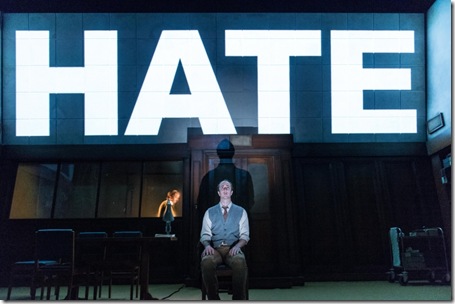1984 Still Packs a Wallop
Photo Manuel Harlan
The American Repertory Theatre is currently presenting George Orwell’s 1984. Newly adapted by Robert Icke and Duncan Macmillan, the British company is touring the US after a long and successful run in the UK. It has a lot going for it, particularly the reference to the book’s appendix, which does not appear in the original American edition.
Most people who read the book will remember newspeak, the language which was to replace oldspeak (Standard English). Newspeak would destroy the individual’s ability to think conceptually by limiting the number and complexity of words. Early American editions of Orwell’s book left the reader with the impression that the totalitarian government had won. And it seems that even in Great Britain, few people pay attention to the appendix, an explication of newspeak principles, which although it appears to be written long after 1984 is in oldspeak from which one may infer that the regime no longer exists. To dramatize the appendix, there is a short scene out of time with the rest of the play in which unknown characters – linguists, politicians, historians? – discuss its content.
The play begins with the ringing of church bells, followed by sirens, and explosions. Bright lights flash and the stage goes to black, a device used throughout. Winston (Matthew Spencer), the protagonist, begins to write a diary, a dangerous act – a thought crime – in Oceania’s totalitarian world in which everyone is surveilled by telescreens and microphones.
Winston is a member of the outer party in the three tiered society. At the top is the smaller, privileged inner party, which has access to luxurious material goods and regulates the behavior of the outer party. The proles, the poorest and most populous group, live in ghetto like conditions, but are not subject to close scrutiny. The state is continually at war.
Winston works in the Ministry of Truth, one of four ministries whose titles belie their essence. The Ministry of Truth creates lies; the Ministry of Peace is in charge of war; the Ministry of Plenty, rationing; the Ministry of Love, torture. Winston’s job involves changing the content of historical documents so they fit the government’s current stand. Original records are destroyed. Loathing of the enemy is encouraged by a compulsory daily two-minute hate session during which Winston and his coworkers are aroused to frenzy by images of the state’s enemies on the telescreen. Loyalty is owed only to Big Brother, the ostensible head of state. Sex is allowed to married couples solely for the purpose of procreation. Children at school are taught to spy on their parents.
Despite his fear, Winston is drawn to Julia (Hara Yanas), an attractive woman who also works for the Ministry of Truth. She initiates the relationship by secretly handing him a note that says “I love you.” Since Winston is played as a hunched, balding, timid type in ill-fitting clothing, her come-on raises suspicion, at least in this audience member. The two have a torrid love affair in a secret room in the prole neighborhood. Julia gives the impression she shares Winston’s desire to bring down the state. Nonetheless, in this world where no one can be trusted, Julia’s behavior is sometimes confusing as when she brings Winston luxury items that should not be available to her.
Winston, who believes that O’Brien (Tim Dutton), an inner party member, is also against the despotic state, meets with him and, along with Julia, joins The Brotherhood, an organization purportedly dedicated to overthrowing Big Brother and his followers. It is all a lie. When we next see Winston, he is in a room in the Ministry of Love suffering horrible tortures inflicted by O’Brien in a scene that seemed to go on forever. A number of people, perhaps unacquainted with the novel, left the theatre at this point. Spencer’s performance in this scene is frighteningly convincing.
Eventually, Winston does more than confess; he is disloyal to his love and himself. When threatened with the most terrifying torture he can imagine, he blurts out, “Do it to Julia.” He becomes disloyal to the person he was when he accepts doublethink’s assertion that two and two equal five. He and Julia meet after he is released. In this production, Julia’s arrest and torture come across as ambiguous. When the two meet, Winston says, “I betrayed you.” As in the book, she answers, “I betrayed you.” But her face does not show the long scar that Orwell described.
In the novel, Winston’s ruminations lend an intricacy lacking in the play where the audience learns less of the dictatorship’s history and functioning. In the play, theatrical effects frequently replace Winston’s thoughts. Nevertheless, Ick and Macmillan’s adaptation is particularly meaningful to American audiences in this time of political uncertainty and fear.
Chloe Lamford’s two level- setting is functional as well as clever. Most often, the stage represents an office in the Ministry of Truth. The long horizontal room, with upstage windows overlooking an indoor corridor, adds to the play’s claustrophobic atmosphere. At other times, the lower level setting shows Winston at home in his dim room. Above is a wide screen which displays both pre-recorded scenes and live projections. We see Julia and Winston’s love affair onscreen. Orwell’s projected slogans such as War is Peace, Freedom is Slavery, Ignorance is Strength hang over the heads of the characters. Winston is tortured in room 101, which is stark white with no means to turn off the bright lights. Natasha Chivers’ effective lighting gives a sense of fear, rage, and violence throughout.
1984 plays at the Loeb Theatre in Cambridge, MA through March 6.
Adapted from George Orwell’s 1984 by Robert Icke and Duncan Macmillan
Directed by Robert Icke and Duncan Macmillan
Design by Chloe Lamford
Lighting by Natasha Chivers
Sound by Tom Gibbons
Video by Tim Reid
Cast
Parsons ………. Simon Coates
O’Brien ………. Tim Dutton
